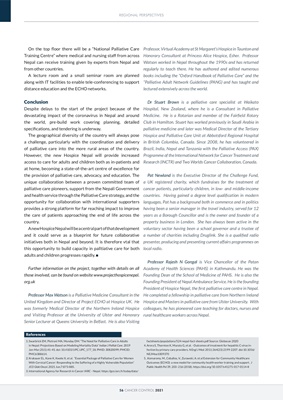
REGIONAL PERSPECTIVES
56 CANCER CONTROL 2021
On the top floor there will be a "National Palliative Care
Training Centre" where medical and nursing staff from across
Nepal can receive training given by experts from Nepal and
from other countries.
A lecture room and a small seminar room are planned
along with IT facilities to enable tele-conferencing to support
distance education and the ECHO networks.
Conclusion
Despite delays to the start of the project because of the
devastating impact of the coronavirus in Nepal and around
the world, pre-build work covering planning, detailed
specifications, and tendering is underway.
The geographical diversity of the country will always pose
a challenge, particularly with the coordination and delivery
of palliative care into the more rural areas of the country.
However, the new Hospice Nepal will provide increased
access to care for adults and children both as in-patients and
at home, becoming a state-of-the-art centre of excellence for
the provision of palliative care, advocacy, and education. The
unique collaboration between a proven committed team of
palliative care pioneers, support from the Nepali Government
and health service through the Palliative Care strategy, and the
opportunity for collaboration with international supporters
provides a strong platform for far reaching impact to improve
the care of patients approaching the end of life across the
country.
A new Hospice Nepal will be a central part of that development
and it could serve as a blueprint for future collaborative
initiatives both in Nepal and beyond. It is therefore vtal that
this opportunity to build capacity in palltiative care for both
adults and children progresses rapidly. n
Further information on the project, together with details on all
those involved, can be found on website www.projecthospicenepal.
org.uk
Professor Max Watson is a Palliative Medicine Consultant in the
United Kingdom and Director of Project ECHO at Hospice UK. He
was formerly Medical Director of the Northern Ireland Hospice
and Visiting Professor at the University of Ulster and Honorary
Senior Lecturer at Queens University in Belfast. He is also Visiting Professor, Virtual Academy at St Margaret's Hospice in Taunton and
Honorary Consultant at Princess Alice Hospice, Esher. Professor
Watson worked in Nepal throughout the 1990s and has returned
regularly to teach there. He has authored and edited numerous
books including the "Oxford Handbook of Palliative Care" and the
"Palliative Adult Network Guidelines (PANG) and has taught and
lectured extensively across the world.
Dr Stuart Brown is a palliative care specialist at Waikato
Hospital, New Zealand, where he is a Consultant in Palliative
Medicine. He is a Rotarian and member of the Fairfield Rotary
Club in Hamilton. Stuart has worked previously in Saudi Arabia in
palliative medicine and later was Medical Director of the Tertiary
Hospice and Palliative Care Unit at Abbotsford Regional Hospital
in British Columbia, Canada. Since 2008, he has volunteered in
Brazil, India, Nepal and Tanzania with the Palliative Access (PAX)
Programme of the International Network for Cancer Treatment and
Research (INCTR) and Two Worlds Cancer Collaboration, Canada.
Pat Newland is the Executive Director of the Challenge Fund,
a UK registered charity, which fundraises for the treatment of
cancer patients, particularly children, in low- and middle-income
countries. Having gained a degree level qualification in modern
languages, Pat has a background both in commerce and in politics
having been a senior manager in the travel industry, served for 12
years as a Borough Councillor and is the owner and founder of a
property business in London. She has always been active in the
voluntary sector having been a school governor and a trustee of
a number of charities including Druglink. She is a qualified radio
presenter, producing and presenting current affairs programmes on
local radio.
Professor Rajesh N Gongal is Vice Chancellor of the Patan
Academy of Health Sciences (PAHS) in Kathmandu. He was the
Founding Dean of the School of Medicine of PAHS. He is also the
Founding President of Nepal Ambulance Service. He is the founding
President of Hospice Nepal, the first palliative care centre in Nepal.
He completed a fellowship in palliative care from Northern Ireland
Hospice and Masters in palliative care from Ulster University. With
colleagues, he has pioneered care teaching for doctors, nurses and
rural healthcare workers across Nepal.
1. Swarbrick EM, Pietroni MA, Munday DM. "The Need for Palliative Care in Adults
in Nepal: Projections Based on Modeling Mortality Data" Indian J Palliat Care. 2019
Jan-Mar;25(1):41-45. doi: 10.4103/IJPC.IJPC_177_18. PMID: 30820099; PMCID:
PMC6388614.
2. Krakauer EL, Kane K, Kwete X, et al. "Essential Package of Palliative Care for Women
With Cervical Cancer: Responding to the Suffering of a Highly Vulnerable Population"
JCO Glob Oncol. 2021 Jun;7:873-885.
3. International Agency for Research in Cancer IARC - Nepal. https://gco.iarc.fr/today/data/
factsheets/populations/524-nepal-fact-sheets.pdf Source: Globocan 2020
4. Arora S, Thornton K, Murata G, et al. - Outcomes of treatment for hepatitis C virus infection by
primary care providers. N Engl J Med. 2011;364(23):2199-2207. doi:10.1056/
NEJMoa1009370
5. .Komaromy, M., Ceballos, V., Zurawski, A. et al Extension for Community Healthcare
Outcomes (ECHO): a new model for community health worker training and support. J
Public Health Pol 39, 203-216 (2018). https://doi.org/10.1057/s41271-017-0114-8
References